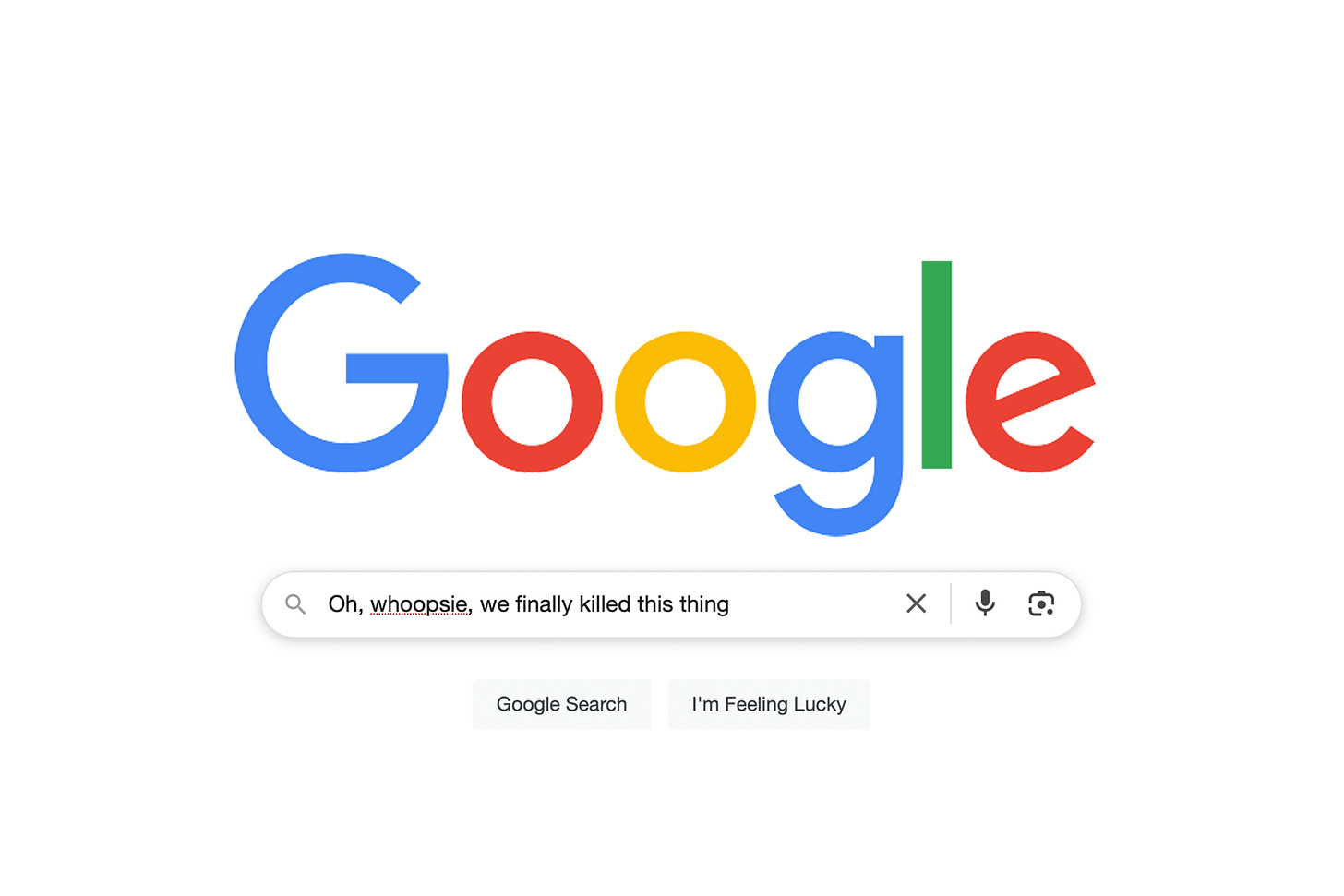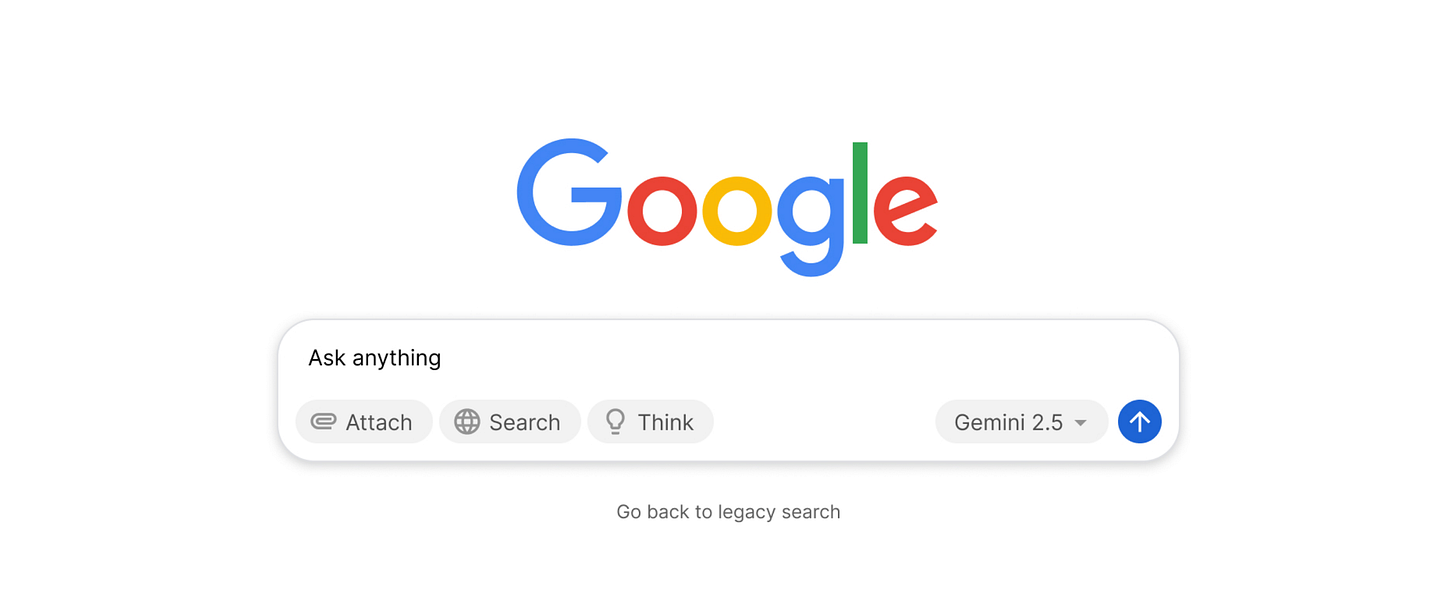Google Search is Dead
I realized the other that I've almost stopped using Google Search, and that makes me kinda sad.
It's possible that I've forgotten to take off my rose-tinted glasses again — yes, sometimes there is positivity here at Trend Mill! — but there's something about Google, circa the early 2000s to mid-2010s, that takes me back to the golden days of the Internet. A time when Google Search was a portal to the web, serving up link after link of websites that were actually useful, interesting and diverse, both in content and in visual style/design. If you're old enough to have read people's random blog sites, you'll know exactly what I'm talking about. Anything and everything went, and it was a fascinating window into culture, opinion and more. Google had a similar vibe to Wikipedia in that you could type in a question or thought and then go down a rabbit hole of wonderful if often wacky, websites.
Unfortunately, we know how the story goes after that. Sure, everything got better in terms of the underlying technology, but at the same time, everything got worse in terms of user experience.
Google, like all of Big Tech, had entered its Shareholder Worship era, also known as the Monetize Everything era or the Bleed Everything Dry to Keep That Chart Going Up era.
And in pursuit of pleasing its shareholders, Google leaned all in on advertising. It's since become its biggest money generator by far, accounting for 75% of Alphabet's $350.02 billion in revenue for 2024. Isn't that bleak? A company of that stature, with all its talent, resources and potential, relies on serving up shitty ads on its search pages. Before we knew it, every link was sponsored or gamed. Put another way, Google used to give us what we asked for. Now, Google gives us what its advertisers ask for. Worse, in an effort to comply — remember, thousands if not millions of businesses rely on search traffic — every website started following the same best practices, the same layouts, the same formats, the same visual styles, and, what do you know, they all started to look the same.
A consequence of pandering to the algorithms of our tech overlords is the Vanilla Internet — an experience so watered down and paint-by-numbers that everything looks, feels, and sounds the same, an attempt to remove the need for users to explore. They've removed curiosity, instead replacing it with what they tell you to see.
Then came AI. While Google's AI Overviews launch was laughably bad, suggesting users eat rocks or add glue to pizza, it survived and seems to work fine now. But it's had a huge impact on the search experience, not least because it takes up the valuable retail space at the top of the page. It's designed to stop people from scrolling down the page. When you factor in the "people also ask" feature and the first couple of paid results, the first page of Google results — once the golden standard of reliable information — is now dominated by generated content and sponsored junk.
This is only the beginning of the move away from traditional search. The company recently demoed its AI mode, which expands on the AI Overview feature, and I think it highlights exactly where the company is going with this: fully AI-generated search, like Perplexity AI or ChatGPT but housed within the iconic Google homepage, and inevitably stuffed with highly targeted advertising.
Like this —
Soon enough, Google Search, as we once knew it, will be dead. It's already broken beyond repair, and its end is inevitable. That would have seemed crazy to me 10 years ago.
Is that a good thing? I don't know. I don't even know if I care. There will always be tools to help us find information on the Internet, whether that's alternative, privacy-focused search engines — most of which are clones of Google now anyway — or more individualistic, isolated experiences of interacting with generative AI chatbots. You know it's gotten bad when generative AI, filled with hallucinations, inconsistencies and outright made up lies, offers a slightly less shitty experience. But, where will these AI search engines be in 10 years? Who knows, either mind-blowingly amazing or absolutely awful. The jury is still out, and with many still relying on Google for information, they may still have a stranglehold here too. But they should be worried.
Slowly but surely, it’s losing its crown. Its search market share dropped below 90% for the first time since 2015. It's fighting constant antitrust lawsuits. It was officially branded a monopoly and accused of abusing that power earlier this year, with calls now intensifying to either break it up or force it to cede space to competitors.
In many ways, it's no more than it deserves. The company took one of the most useful tools of the Internet, twisted it into an ad platform and data harvesting machine, and did everything in its power to shut down competition in an attempt to force us to use it. They became greedy and, in doing so, destroyed their product, piece by piece.
I do miss it, but perhaps, one day, when I’m using the next iteration of search, one that hopefully isn’t controlled by a monopolistic leech (don’t count on it), I'll see that it was for the best.





It's not any better for the businesses either. We effectively need to use Google Ads or we're out of business.
Google didn’t lose to AI. It lost to its own greed. Great post.